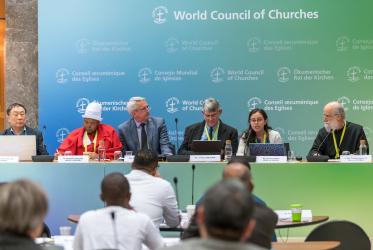National HIV/AIDS strategic planning and policy development workshop
Communiqué
Abuja, Nigeria, 10 - 14 November 2003
Preamble
We, (some Bishops, clergy and members) of the Church of Nigeria (Anglican Communion) drawn from all the ten ecclesiastical Provinces across the country, met in Abuja from 10th to 14th November 2003 to draw up a strategic plan of how our church will respond to the HIV/AIDS pandemic in Nigeria.
We would like to record our sincere appreciation to the Action Aid (Nigeria), Christian Aid and the Council of Anglican Provinces of Africa (CAPA) who have funded and supported this workshop to develop the Church of Nigeria Strategic Plan and Policy Development document. Also to thank the Policy Project Nigeria for their support.
We believe that as a church, following the footsteps and example of our Lord Jesus Christ, we are well suited to give hope to a hurting world in the face of HIV/AIDS. Our theme hence was: "A caring church in a hurting world."
The four-day meeting was officially opened by His Grace the Archbishop and Primate of All Nigeria, The Most Rev. Peter Akinola who challenged us to uphold Biblical teaching as the surest way of stemming new HIV infections.
We focused on a six-fold response to AIDS, which has been developed and adopted by the Anglican Communion through the All Africa AIDS Planning Framework. The six core areas of our response include: prevention, counselling, pastoral care, care and support, death and dying and leadership.
We have together developed our HIV/AIDS vision which is "a caring church committed to preservation of life by preventing the spread of HIV/AIDS and caring for people living with and affected by HIV/AIDS."
As a caring church living by the example of our Lord and Saviour Jesus Christ our mission is to prevent and control the spread of HIV/AIDS and to offer support to people living with and affected by HIV and strive towards having a future generation that will be born and live in a world free from AIDS.
To achieve our vision and mission we have set out the following policy guidelines that will guide our response as a church in addressing HIV/AIDS.
Prevention:
-
The church will encourage sexual abstinence for the unmarried and mutual fidelity among married couples.
-
The church shall set aside a week within the year as a HIV/AIDS awareness week.
-
The church shall carry out AIDS awareness and sensitisation specifically targeting the adolescents.
Care and support:
-
The Church of Nigeria (AC) shall be HIV/AIDS friendly and shall ensure greater involvement of people living with HIV/AIDS in all aspects of church ministry.
-
The church shall encourage the establishment of home-based care services to cater for people living with HIV/AIDS (PLWHA) and people affected by AIDS (PABA) in our churches and communities.
Leadership:
-
The church leadership shall play a leading role in advocating for elimination of harmful traditional practices that predispose people to contracting HIV.
-
The church shall advocate for the fundamental human rights of people living with and personally affected by HIV/AIDS i.e. access to health services, employment, education, housing etc.
-
The Church of Nigeria (AC) shall set up an appropriate structure for implementation, monitoring and evaluation of the HIV/AIDS programme.
Pastoral care:
-
The church shall ensure that all its clergy are sensitised, knowledgeable and well informed to share accurate information about HIV/AIDS.
-
The church shall incorporate HIV/AIDS into the curriculum of all its seminaries, theological colleges and mission schools.
-
The church is committed to further theological reflection on issues pertaining to HIV/AIDS.
Counselling:
-
The church shall encourage Voluntary Confidential Counselling & Testing (VCCT) and the setting up of support and referral networks with the government and agencies that share the same vision.
-
Through Christian counselling, the Church of Nigeria (Anglican Communion) shall reinforce the adherence of Christian family values.
Death and dying:
-
The Church of Nigeria (AC) shall encourage its members to write wills and preserve resources for those living on.
-
Bishops and pastors shall take a lead in discouraging expensive funeral ceremonies and modify rituals to still honour the dead.
The above policies will be implemented systematically and in a concerted way throughout the Anglican Communion in Nigeria and we believe will receive the support of all the members of our Church.
CONCLUSION
The participants have undertaken to carry out activities in their dioceses with the existing human and material resources to mitigate the impact of the pandemic in their parishes and communities. Immediate actions will include pulpit ministry, peer education, skills building workshops and seminars for youth, women groups, fathers associations and pastors.





